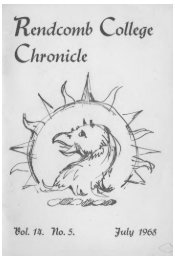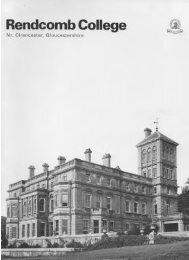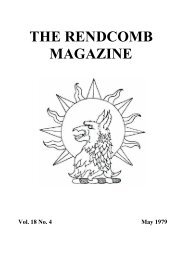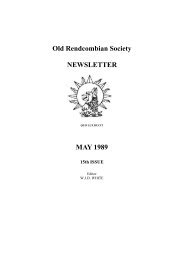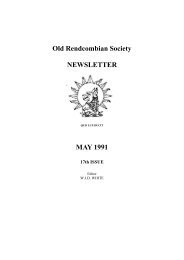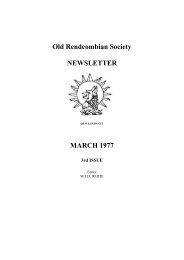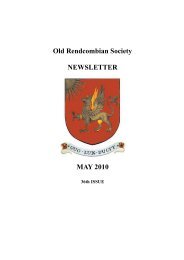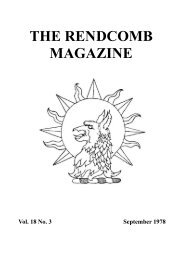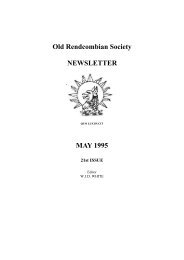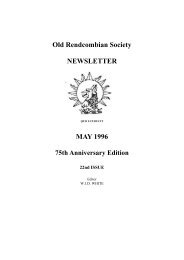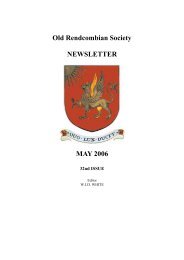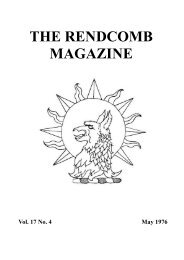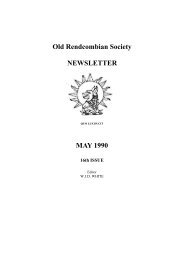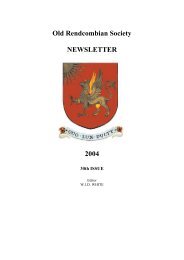The Rendcomb Magazine, May 1975 - The Old Rendcombian
The Rendcomb Magazine, May 1975 - The Old Rendcombian
The Rendcomb Magazine, May 1975 - The Old Rendcombian
- No tags were found...
You also want an ePaper? Increase the reach of your titles
YUMPU automatically turns print PDFs into web optimized ePapers that Google loves.
THE DEBATING SOCIETYThis has been an exceptionally active year for the Debating Society, with the addition of two closely fought fixturesagainst Hatherop; the first of which indicates an unusual and commendable concern on the part of the first year sixthfor the world‟s standards in ethics and morality (see motion). <strong>The</strong> girls felt themselves more than adequately entertainedand enlightened, and the latter debate, also very much a social occasion, saw the <strong>Rendcomb</strong> fifth year turningintellect against charm this time on away ground.Autumn and Lent Term Senior Debates were:“This House accuses the British Nation of submission to Capitalist Brainwashing”“This House believes that contemporary „Pythonesque‟ humour can be only advantageous to the Nationsof the World”. (v. Hatherop)“This House believes that a white lie is never justifiable”. (Fifth year v. Hatherop)* * * *D.J.B.AT the fifth year debate and social, Hatherop provided an excellent meal before the debate and the conversation flourished.Opposing the motion were P. Curtis-Hayward and Antony Ashmore. <strong>The</strong> chairwoman asked the opposition to speakfirst, which was rather unorthodox, but we delivered our speeches. <strong>The</strong> proposition put forward very good speechesbut mainly based upon child upbringing which is not a boy of 16‟s favourite subject. We were, therefore, beset by anonslaught of questions on child psychology which we could not answer. <strong>The</strong> male opposition tried in vain to steer thedebate towards the question of the Watergate scandal. Eventually the chairwoman decided enough had been said aboutPresident Nixon and child psychology.<strong>The</strong> motion was won by 20 votes to 16 with 4 abstentions.Coffee was served after the debate and after being shown around the school we left at about 9 o'clock.A very pleasant evening was had by all and we should like to thank Hatherop for their excellent hospitality.* * * *P.C-H.THE junior half of the school have been no less active. Debates were held in both terms and were well attended, thestandard of speaking being often as good as (or even superior to) that in the senior debates.* * * *Christmas Term Junior Debate: “This House believes that the Scientific Progress of this Century is more advantageousthan disadvantageous”.<strong>The</strong> three speakers for this motion, Sutherland, Steed and Pitt, came into the library with their lab jackets on, while thethree speakers against, Purkiss, Webb and Curtis-Hayward, came into the library with grass in their sports jackets. Sothe scene was set for a lively debate. Sutherland said that many of the people at the debate would have died had it notbeen for progress in medicine. Purkiss retorted that soon we shall all die because of the chemicals from modern machinerypolluting our streams and the atmosphere. Steed said that machines like washing machines, cars and refrigeratorsare now invaluable and give people more free time to enjoy themselves. Curtis-Hayward, in an excellent address,said that too many dangerous drugs are now being sold on the black market. After the six main speeches, many interestingpoints were raised from the floor, although there were too few from the first form willing to make a speech.Altogether it was a very interesting debate.Result: For 17; Against 35; Abstentions 5.* * * *R.S.Spring Term Junior Debate: “This House believes that Capital Punishment should not have been abolished”.Tudor opened the debate by claiming that if murderers knew they were going to be hanged they would not commit thecrime in the first place. But the criminal knows that all he will receive is ten years in a “free hotel”. Nunan looked atthe subject from the religious angle. He said that in the Bible it says, “Thou shalt not kill”, and asked who has the rightto kill somebody apart from God? He also said that killing was barbaric. Strong followed this up by saying that if amurderer knew he was going to be hanged he would be more willing to shoot his way out if surrounded by the police.Also, if after the trial it were found that the suspected murderer were innocent, he could not be dug up. Lovett said thatthe I.R.A. would be glad to martyr themselves and that criminals in general would be more willing to carry firearms.<strong>The</strong>n the police would have to carry firearms and we would be in the situation America is in at the moment, but at the33



